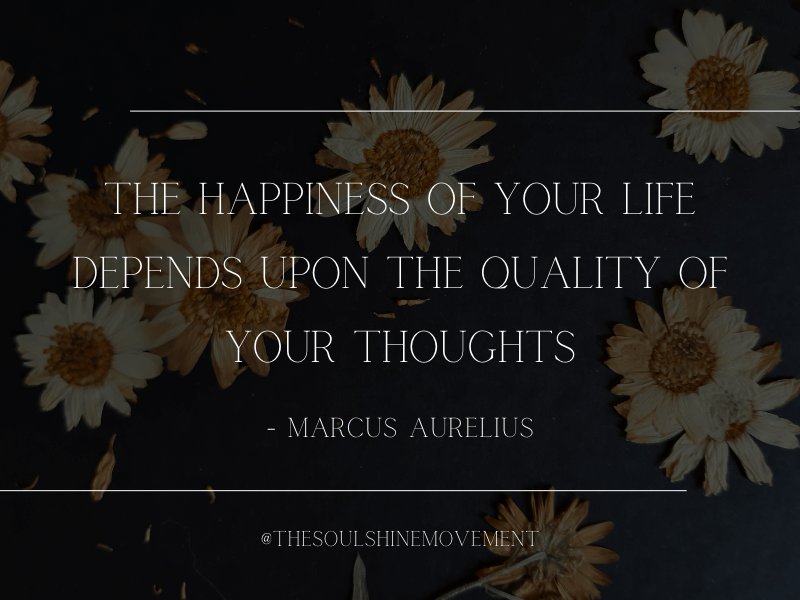Your mindset impacts your thoughts, your values, your relationships, and how you view the world.
Our mindsets are one of our most valuable assets, and bringing awareness to your state of mind is one of the most beneficial actions you can take to live a happy and successful life.
Cultivating a healthy mindset allows you to accept yourself fully as you are and focus on living a life that is centered around what you value. It can also help to reduce feelings of stress, anxiety, inadequacy, and irritability.
Something that seems to be underrated in modern society is just how powerful and impactful our mindsets can be. Our mindsets influence our reality; the world you get to participate in is highly dependent upon your beliefs about yourself and your abilities.
“Research shows that mindsets play a significant role in determining life’s outcomes. By understanding, adapting and shifting your mindset, you can improve your health, decrease your stress and become more resilient to life’s challenges.”
– Mia Primeau, Stanford Report
Can you think of anyone in your life who always seems calm and collected? Someone who has a relatively positive outlook on life, has a calming energy, and isn’t afraid to show up as their true self every day?
There are many qualities that people with healthy mindsets share, and these are qualities that can be acquired by anyone. You can learn to be the type of person who embodies a healthy mindset and moves through life with confidence and clarity, so long as you are willing to put in the work to get there.

Below you’ll find seven qualities of a healthy mindset and seven actions you can take to start embracing those qualities.
1. You Are Emotionally Aware
The ability to bring awareness to your emotions is a key quality to gaining a healthier mindset. Observing our feelings without judgment and holding space for those emotions can help us grow and become more understanding humans. Allowing yourself to make room for the emotions and take notice of why they arose can be the first step to emotional awareness.
Our feelings are not good or bad, they just are. We are wired to feel. The range of emotions we feel throughout our lives is one of the most beautiful aspects of the human race.
Most of us strive for continued happiness, but happiness wouldn’t be meaningful without anything to compare it to. So the next time you’re feeling sorrow or pain, allow yourself to truly feel it. Let it in, try to understand where it’s coming from.
Learn to identify what makes you feel a certain way, and make adjustments to your life accordingly. Be kind to yourself when you’re living through the more difficult emotions, and find gratitude and soak it all in on the good days.
Action 1: Start a Mindfulness Practice
Practicing mindfulness goes hand in hand with learning to be emotionally aware. Mindfulness is simply bringing intentional awareness to the present moment, and there are many different things you can do to practice.
Two simple things you can do to get started with mindfulness are journaling and meditating. Both allow you to observe your feelings without judgment and bring awareness to your emotional state. The more you practice mindfulness, with these or any techniques, the more in tune you’ll be with yourself and the better you’ll be able to regulate your emotions.
2. You Can Effectively Calm Yourself
Everyone faces difficult moments in life, and people’s reactions to a tough situation can tell you a lot about them. Learning how to calm yourself in these situations will contribute to a healthy mindset.
When something happens that causes you pain or frustration, how do you react? Are you impulsive? Do you allow your emotions to take over and cloud your judgment? Do you end up saying things you don’t mean?
The ability to calm yourself before reacting to a painful situation can save you a lot of emotional turmoil and regret. I learned this the hard way, but sometimes that is the only way we learn. If you can think of a situation where you acted impulsively and regretted it, reflect on the experience and ask yourself what you could have done differently.
Action 2: Practice Breathwork
Breathwork is a form of active meditation in which you are consciously controlling your breath.
Specific breathing exercises such as the 4-7-8 technique can initiate a physiological response, returning your body to a calmer state when you’re angry or stressed.
Our breath has the power to regulate the energy that flows through our body; the trick is learning how to use it.
The next time you get upset about something, slow down and ask yourself if you are seeing the situation accurately or if you are projecting your feelings onto what is happening. Remove yourself from the situation, use a breathing technique to calm yourself, and give yourself time to clear your head before you react.
3. You Are Present in the Moment
We live in a world of constant digital distractions. Can you think of the last time you were in a room where nobody was on their cell phone?
Even without the issue of digital distractions, it can be easy to get caught up in your own thoughts and let the outside world disintegrate.
Learning to be present in the moment is a key quality for a healthy mindset. Too often we get caught up in what we can’t control, what is in the past, or what is happening halfway across the country to a person we barely know (thanks to social media). We can learn to let all of that go and engage fully in life, or let it consume our thoughts and attention while life passes us by. The choice is yours.
Action 3: Take Digital Breaks
How often do you take a day or a week off of social media? What does your screen time report look like every week? Reports have shown that the average iPhone user spends close to 40 hours per week on their mobile devices.
Our screens are literally stealing our time, and time is the most valuable resource we have.
Challenge yourself to a week without social media, and see how it affects the rest of your life. Do you feel more connected to yourself? To others? Did you have time to get to a project you’ve been putting off?
Taking digital breaks, being intentional about the time we do spend on screens, and putting the phone away when we’re having conversations with others allows us to be more fully engaged in the present moment, which ultimately leads to a healthier mindset.
4. You Take Care of Yourself
Taking care of yourself is foundational for living a healthy life, so not surprisingly it’s an important factor in cultivating a healthier mindset.
There are four key areas in your life that you should be focused on, and finding a balance is important because they are all interconnected. The first three areas relate to your physical well being: sleep, nutrition, and exercise. The fourth area focuses on your mental well-being: mindfulness.
Having poor physical health can lead to poor mental health and vice versa, so make sure you are taking care of your whole self. Eat healthy foods, find movement in every day, stay hydrated, get lots of sleep, and be mindful.
Related Reading: Top Tips for Self-Care (Plus the 8 Areas You Should Focus On)
Action 4: Create a Fitness and Nutrition Plan
If you’re the type of person who always says you’re going to get around to working out or eating healthy but just can’t seem to find the motivation to actually do it, setting up a plan to hold yourself accountable could be a good first step to take.
Get honest with yourself about what seems reasonable to you. What type of workouts can you commit to and how often? What are healthy foods that you can get on board with eating?
Create a plan for the week that schedules out your workouts and meals, and try to stick to it. Monitor your mindset throughout the week and notice if you feel like you have a healthier mindset on days that you’ve focused on nutrition and gotten some movement in.
5. You Embrace Playfulness
Take a moment to remember a time when you were a kid playing outside with your siblings or friends. Do you remember what it felt like? For me, I think of pure joy, no responsibility, and no worries about the future.
We often lose that spark of playfulness as adults. Life gets hard, and we get too serious. There are jobs to do, bills to pay, and responsibilities left and right. Sometimes we get so caught up in all of that that we forget to spend time just enjoying ourselves.
When you spend time in a playful state of mind, you learn to enjoy the little things in life. You don’t let stress be all-consuming, and you know that no matter what, you can still find joy in the purer things in life. Your mindset will thank you.
Action 5: Spend Time on a Hobby
Whether you love to hike, make crafts, or be involved in a book club, find what hobbies resonate with you, and make time for them.
Drop the seriousness, drop the stress, and fully immerse yourself into something you love. Let the worries melt away for a short while, and embrace the feeling of playfulness that makes you feel like you’re a kid again.
6. You are Curious
Curiosity allows us to explore every area of our mind. It gives us permission to seek understanding. It allows us to learn and grow.
Be curious about your thoughts and feelings. Be curious about the world around you. When you are curious in every aspect of life, you learn more about yourself. You become less judgmental and more open-minded.
Curiosity is often associated with intelligence because those that are curious find more opportunities to learn. And just as curiosity can help us learn in an intellectual way, it can help us learn to better understand our own thoughts and empathize with others. It helps us cultivate a healthier mindset.

Action 6: Ask Questions
The next time you get curious about something, start asking questions. Just as we often lose playfulness as adults, we can lose our curiosity. We may have a curious thought pop into our head and just dismiss it instead of pursuing it.
Whether you’re curious about why a friend acted a certain way, why you’re upset over something seemingly insignificant, or why the sky is blue, start asking questions. Start finding answers. When you engage in curiosity, you become more open-minded, which leads to a healthier mindset.
7. You are Vulnerable
Vulnerability is a tough one. Vulnerability can open doors to pain, but it can also open doors to growth. When we are vulnerable, we let the world see our true selves and we become more aligned with what we believe in.
“Choosing to own our vulnerability and do it consciously means learning how to rumble with this emotion and understand how it drives our thinking and behavior so we can stay aligned with our values and live in our integrity.”
– Brené Brown, Dare to Lead
Leaning into vulnerability allows us to better understand our emotions and to let others in. When we are vulnerable, we find out who our people are. The people that accept every part of us, even the parts that we find difficult to accept ourselves.
Vulnerability is a key quality for a healthy mindset because it encourages alignment with who you are on the inside and how you act on the outside. You worry less about what others think because you’ve shown yourself that the people who matter will love you no matter what.
Action 7: Have the Difficult Conversations
All too often people avoid talking about uncomfortable topics. We prefer to keep our thoughts bottled up rather than express our true emotions and risk judgment or rejection.
But the uncomfortable and difficult conversations are where we grow. They are where we learn from our mistakes and where we can learn from others.
Have the difficult conversations, but remain calm (back to step 2!). When we get defensive, the conversations lose value. The point is not only to be vulnerable with your own perspective, but to also allow the other person to be vulnerable with theirs.
The difficult conversations are where we learn to recognize that everyone sees the world a little differently, and that’s okay.
They are where we gain confidence in ourselves, because they help us to recognize that at the end of the day, we are all just human.
Final Thoughts
Your mindset impacts your reality. If you think you aren’t good enough to achieve your goals, you won’t achieve them. If you ruminate in feelings of unworthiness, you will believe that you are less than and let that hold you back (when in reality, we’re all just human).
If you focus on cultivating a healthy mindset, you’ll learn to understand that we all have the ability to achieve our dreams if we’re willing to put in the work. You’ll start to recognize that we are all just human, and it’s our actions that set us apart from one another.
Creating a healthy mindset leads to healthier thoughts, and our thoughts are ultimately what guide the direction of our lives.

Which of these qualities do you already feel confident in? Are there any that you struggle with and could spend some time working on?











0 Comments